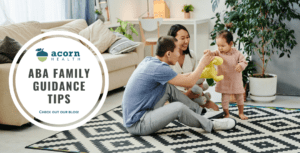Clinically reviewed by Paul Doher, BCBA, M.A., LBA, National Director of Clinical Quality

What are the goals of ABA Parent Guidance?
The ultimate goal for a child who experiences Applied Behavior Analysis therapy at Acorn Health is that they graduate from therapy and are supported by those in their lives when intensive therapy is no longer needed. We want your child to achieve generalization of their skills to be relevant to relevant context and people, and to be able to maintain those skills over time. Perfection is never the goal – ABA therapy is a journey that children, family members and caregivers will continue to navigate together.
At Acorn Health, our goal is to prepare learners to lead fulfilling and independent lives. We know in order for that goal to be achieved, caregivers in their lives need to be prepared and skilled. Applied behavior analysis (ABA) therapy cannot be something that lives in a silo of a learner’s life at the clinic. That mentality puts up barriers for the child to make progress in all settings – like home – and progress will be minimal.
That’s why we believe that Family Guidance is so important to a learner’s success at Acorn Health. It is a regularly occurring meeting between parents/caregivers and a child’s BCBA where information is shared openly in the spirit of supporting the child as a team.
What topics are included in ABA Parent Training?
During Parent Guidance meetings (previously referred to as “Parent Training” or “Family Training”), parents are kept up to date on a child’s progress, hurdles and potential changes to programming. Caregivers are taught how to implement interventions by the BCBA during these meetings. Social competence expectations and how these are being observed at school, social and family environments, are an important topic discussed as well. Additionally, these structured meetings provide a forum for caregivers to share feedback or observations.
Parents also learn how to effectively implement interventions at home or in their child’s everyday lives. This learning is done through behavior skills training in which the caregiver will receive instruction and modeling on how to run a program with an opportunity to rehearse, followed by feedback on performance. Natural environment interventions are discussed, which are interactions that occur in the learner’s daily life, and are events or activities important for leading a fulfilling and independent future.
What is the role of parents in ABA therapy?
The most important role of parents in ABA therapy is to support and be open to learning alongside your child. Caregivers who understand that the road to making progress in ABA therapy can be long, that success is measured in small gains, and occasionally regression will occur, are the ones who are best prepared to help their child. Resilience and perseverance are crucial to meeting goals for both the child and the family.
How can parents feel better prepared to help their children?
Parents can feel most prepared by embracing the concept that life can be messy and unpredictable, which means we need to prepare learners for this unpredictability. The goal of ABA therapy is that they can go out into the world and apply the skills they have learned so they can reach their greatest potential. Parents will feel prepared to support this goal by working closely with their child’s BCBA as a partner and cheerleader.
Frequently Asked Questions
Why is role playing helpful in behavioral skills training?
Until a parent is in a situation with the child, there are many external factors that can impact a child’s reaction to a situation. Role playing allows the caregiver to experience firsthand how to implement ABA interventions before they are called upon to do so in real life. Listening to a BCBA explain a technique is different than actually doing it. When a caregiver hears what to do, sees what to do (through modeling), and then rehearses what to do, this strengthens the learning experience and gives the caregiver confidence to use those skills when needed.
What is some additional information parents should know about ABA?
When it comes to getting the most out of Parent Guidance, parents should be prepared for open and honest communication, which means no shaming or blaming. The best sessions will be when BCBAs and caregivers work together on problems instead of pushing a problem off to be handled by someone else. Additionally, caregivers should be open to new ideas and to trying approaches they may not have tried before.
If you are interested in learning if Acorn Health is the right place for your child to begin their ABA therapy journey, call us to schedule a free consultation at 844-244-1818.